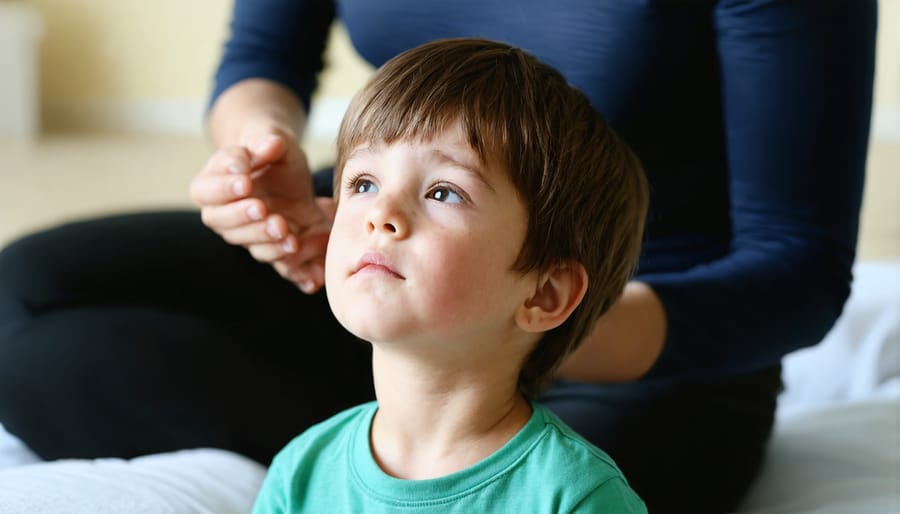Start open, honest conversations with children about mental health early on to reduce stigma and encourage them to share their feelings. Use age-appropriate language, mental health awareness resources, and lots of love and patience. Model healthy coping mechanisms like deep breathing, journaling, and seeking support when you need it. Build a strong support system for your child that includes trusted family, friends, teachers, and mental health professionals. Advocate for comprehensive mental health education and services in schools and communities.

Encourage Open Communication
Lead by Example
Parents play a crucial role in modeling healthy emotional expression and coping skills for their children. By openly discussing your own feelings and demonstrating positive ways to manage stress, you teach your child valuable lessons about mental well-being. When faced with challenges, show your child how to take deep breaths, engage in self-care activities, or seek support from loved ones. Encourage open communication within the family, creating a safe space for everyone to share their thoughts and emotions without judgment. Remember, children learn by observing and imitating the adults in their lives, so prioritize your own mental health and lead by example.
Create a Safe Space
Creating a safe, judgement-free zone is essential for encouraging children to open up about their mental health. Start by establishing trust through active listening and validating their feelings. Assure them that it’s okay to share their thoughts and emotions without fear of criticism or punishment. Provide a calm, private space for conversations and let them know you’re always available to listen. Avoid interrupting, offering unsolicited advice, or minimizing their concerns. Instead, show empathy and understanding, and ask open-ended questions to help them express themselves. Remember, the goal is to create an environment where they feel heard, respected, and supported.
Promote Healthy Habits
Promoting healthy habits is essential for nurturing children’s mental well-being. Physical health and mental health are closely interconnected, and establishing positive routines can have a profound impact on a child’s overall well-being. Regular exercise, such as playing sports, going for walks, or engaging in fun physical activities, can help reduce stress, improve mood, and boost self-esteem. A balanced and nutritious diet is also crucial for maintaining good mental health. Encouraging children to eat a variety of fruits, vegetables, whole grains, and lean proteins can provide the necessary nutrients for optimal brain function and emotional regulation. Adequate sleep is another critical factor in promoting mental well-being. Establishing a consistent bedtime routine and ensuring children get the recommended amount of sleep for their age can improve their ability to cope with stress, regulate emotions, and maintain focus. In today’s digital age, it’s also important to limit screen time and encourage children to engage in real-world activities and face-to-face interactions. By promoting healthy habits and leading by example, parents and caregivers can help children develop a strong foundation for lifelong mental well-being.

Build a Support Network
Building a strong support network is crucial for promoting mental health awareness and well-being in children. Parents, teachers, and healthcare professionals can help kids establish positive relationships with family members, friends, and mentors who can offer guidance, encouragement, and a listening ear during challenging times. One way to foster these connections is by encouraging children to participate in activities they enjoy, such as sports teams, clubs, or volunteer groups, where they can meet peers with similar interests and values. Parents can also model healthy friendships by inviting friends over, engaging in family activities, and discussing the importance of kindness and empathy in relationships.
Another effective strategy is to connect children with role models who exemplify resilience, compassion, and mental health advocacy. This could include older siblings, cousins, coaches, teachers, or community leaders who have overcome obstacles and can share their experiences and coping strategies. By surrounding children with a diverse network of supportive individuals, we can help them build the confidence, self-esteem, and emotional intelligence needed to navigate life’s challenges and maintain good mental health. Remember, it takes a village to raise a child, and by working together, we can create a nurturing environment that promotes mental wellness for all.

Teach Coping Skills
Practice Makes Progress
Encouraging children to regularly practice coping strategies, even when they’re not feeling distressed, can help make these techniques feel more natural and automatic. Just like learning any new skill, the more kids practice, the easier it becomes to use these tools in times of need. Parents and caregivers can help by modeling healthy coping mechanisms themselves and providing opportunities for kids to practice in low-stress situations. This might involve setting aside time each day for relaxation exercises, journaling, or other coping activities. By making these strategies a normal part of daily life, children can build resilience and feel more prepared to handle challenges when they arise.
Know When to Seek Help
It’s crucial to be aware of signs that may indicate a child is struggling with their mental health. Red flags include persistent sadness, anxiety, or irritability; changes in eating or sleeping habits; difficulty concentrating; loss of interest in activities they once enjoyed; and thoughts of self-harm or suicide. If you notice these signs, don’t hesitate to reach out for help.
Start by having a compassionate, non-judgmental conversation with the child about your concerns. Let them know you’re there to support them. If the child’s symptoms persist or worsen, it’s essential to seek professional help through counselling services or a mental health provider. Reach out to a mental health provider, such as a therapist or counselor specializing in child and adolescent mental health. Your child’s pediatrician can also provide referrals and guidance.
In case of a mental health emergency, such as a child expressing suicidal thoughts or intentions, seek immediate help. Contact a local crisis hotline or take the child to the nearest emergency room. Remember, seeking help is a sign of strength, not weakness. By getting the support they need, children can learn to manage their mental health challenges and thrive.
Fight the Stigma
One of the most powerful ways to spread mental health awareness is to normalize conversations about mental well-being and challenge the misconceptions surrounding mental illness. By treating mental health conditions with the same compassion and understanding as physical ailments, we can help break down the barriers that prevent many from seeking help. It’s crucial to emphasize that mental health struggles are nothing to be ashamed of and that reaching out for support is a sign of strength, not weakness. We can fight the stigma by sharing personal stories, amplifying the voices of those with lived experiences, and promoting accurate information about mental health. By fostering open and honest dialogues in our homes, schools, and communities, we can create a more supportive and inclusive environment that encourages children to express their feelings without fear of judgment. Together, we have the power to challenge the stigma and ensure that every child knows they are valued, supported, and never alone in their mental health journey.
Conclusion
In conclusion, promoting children’s mental health is an ongoing process that requires consistent effort and support from parents, teachers, and healthcare professionals. By fostering open communication, encouraging healthy habits, building strong support systems, teaching coping skills, and fighting stigma, we can create a foundation for lifelong mental well-being. Remember, small actions can make a big difference in a child’s life. Start implementing these strategies today, and watch as your child grows into a resilient, emotionally healthy individual. Together, we can create a world where every child feels valued, supported, and empowered to thrive. Let’s continue to spread mental health awareness and prioritize the emotional well-being of our children, ensuring a brighter future for generations to come. By taking action now, we can make a lasting impact on the lives of countless children and families, creating a society that truly values and nurtures mental health from an early age.







